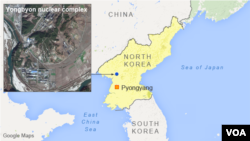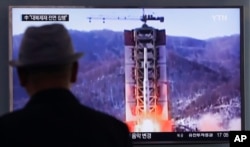The top U.S. nonproliferation official is in Africa to try to align nations against North Korea’s nuclear ambitions by urging them to cut ties with Pyongyang. The threat, he says, is not as far away as it seems.
The increasingly belligerent, mountainous hermit kingdom of North Korea feels like it is a world away from the broad savannas of Africa.
But it isn't, says Thomas Countryman, the assistant secretary for International Security and Nonproliferation.
“What I’ve said to friends all over the world, including those who are far away from Asia, whether it’s Africa or South America, is that the North Korean challenge is not something that is distant and that does not concern them," he said. "In fact, this is the place in the world where, thanks to both the actions and the rhetoric of the North Korean regime, there is the highest probability of serious conflict. There is the highest probability of the first use of nuclear weapons in more than 70 years. And every country in the world has to take that seriously.”
Thomas Countryman spoke to VOA News from Pretoria, South Africa’s capital, as part of a visit to two African nations with strategic ties to the issue.
South Africa, the continent’s most developed nation, is the only African nation to have developed nuclear weapons, though it ended the program in 1989. And the oil-rich nation of Angola currently sits on the U.N. Security Council, which recently condemned what appeared to be a failed missile test by North Korea in April, and is seeking to impose more sanctions on the already isolated nation, estimated to have at least 10 nuclear weapons.
Angola is one of several African countries whose Cold War-era allegiances have left them with good relations with North Korea. And, like the Democratic Republic of Congo and Zimbabwe, it has recently bought arms and military equipment from North Korea.
Countryman says that if African nations want to diminish North Korea’s nuclear threat, they need to cut the purse strings, as Uganda did in May.
He also told VOA he is speaking to African nations about other security threats, such as recent indications that terror groups may take up biological and chemical weapons.
But amid the talk of nuclear bombs, gas and large-scale weapons, Countryman said a depressing fact remains: on the African continent, the simple bullet remains the real weapon of mass destruction.
The multilateral Arms Trade Treaty has been signed by more than 80 countries, but too many weapons still pass effortlessly through African borders.





